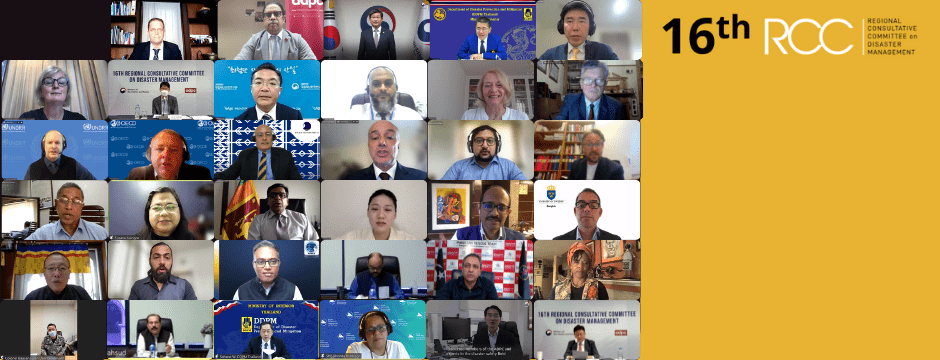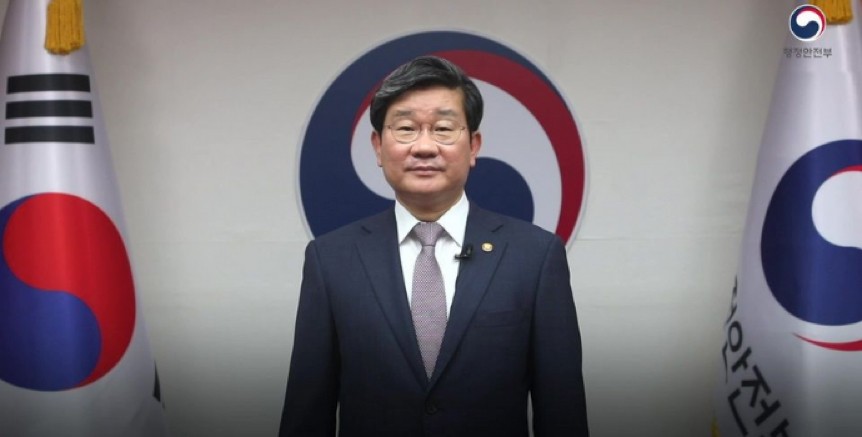16th RCC Meeting held online with the theme Innovation, inclusion, and finance
RCC/News & Events/Default/16th RCC Meeting held online with the theme Innovation, inclusion, and finance

Organized by the Asian Disaster Preparedness Center (ADPC) and the Republic of Korea’s Ministry of the Interior and Safety (MOIS), the 16th RCC meeting was for the first time conducted online from 30 September – 1 October 2021.
With the overarching theme of ‘Financing Resilient Development in Asia and the Pacific’, participants discussed accelerating the implementation of global frameworks through the financing of, and regional cooperation on resilient development in Asia and the Pacific, with a particular focus on promoting innovation and inclusion in resilient development practices.

H.E. Hae-cheol Jeon, Minister of the Republic of Korea's MOIS, gives his welcoming remarks as the incoming RCC Chair.
After two days of thoughtful dialogue on a range of topics, such as creating an enabling environment for financing resilient development and growth, as well as promoting innovation, inclusion, localization, and promoting regional cooperation, the 16th RCC meeting issued the Sejong Statement on disaster risk reduction and climate resilience on behalf of over 200 participants.
The Sejong Statement calls upon the parties to support in the implementation of global frameworks, enhance climate and disaster risk finance and investments mechanisms by assessing and managing their exposure to damages and losses and using the existing and new technologies, and promote the development, strengthening, and sharing of good practices on risk transfer, insurance mechanisms, and instruments, risk-sharing, and retention.
The Sejong Statement also highlights the importance of the continued relevance of reducing inequalities by ensuring the utility of gender-equal, rights-based, and localized approaches in regional, national, and local programs for social participation, collaboration, and synergy at all levels, as well as promoting close cooperation with partners in the international community, businesses, international financial institutions, and other stakeholders.
H.E. Hae-cheol Jeon, Minister of MOIS, said that the Republic of Korea was looking forward to cooperating with a global society on a multitude of risks. “From natural disasters in an unprecedented scale, to new kinds of disasters such as COVID-19, we are encountering a lot of challenges in different forms,” he said, adding that the 16th RCC meeting “will be a precious opportunity to set the course of solidarity between members in diverse areas, including the finance section.”
Mr. Hans Guttman, Executive Director of ADPC, said the discussions at the RCC Meeting carried forward the momentum of regional cooperation despite current restrictions. He said that ADPC is grateful for all these inputs and will support the necessary work to “promote opportunities for cooperation” to “deliver benefits to RCC countries, partners, and observers.”
National Disaster Management Organizations from 16 RCC member countries, which included Bangladesh, Bhutan, Cambodia, P.R. China, India, Lao PDR, Maldives, Mongolia, Nepal, Pakistan, the Philippines, Republic of Korea, Sri Lanka, Thailand, Timor-Leste, and Viet Nam and over 60 observer organizations from UN Agencies, development partners, civil society, NGOs, academia, and research institutes participated in the two-day event.
The Swedish government supported the RCC meeting through the Swedish International Development Cooperation Agency (Sida). Ms. AnnaMaria Oltorp, Head of Development & Cooperation Section for the Asia and Pacific Region at Sida based at Embassy of Sweden to Thailand, spoke on the importance of strengthening regional collaboration to prepare for, and bolster resilience to disasters and climate change. She also highlighted Sweden’s ongoing support to ADPC and other partners to build capacities to disasters in the region.
The RCC mechanism seeks to promote consultation and cooperation on reducing disaster risks. Established in 2000 with ADPC as its Secretariat, it comprises of National Disaster Management Organizations (NDMOs) from over 20 member countries across Asia and the Pacific region. The RCC mechanism has promoted peer advocacy and exchange of expertise in Disaster Risk Reduction (DRR) and Climate Resilience (CR) for the last 20 years.
